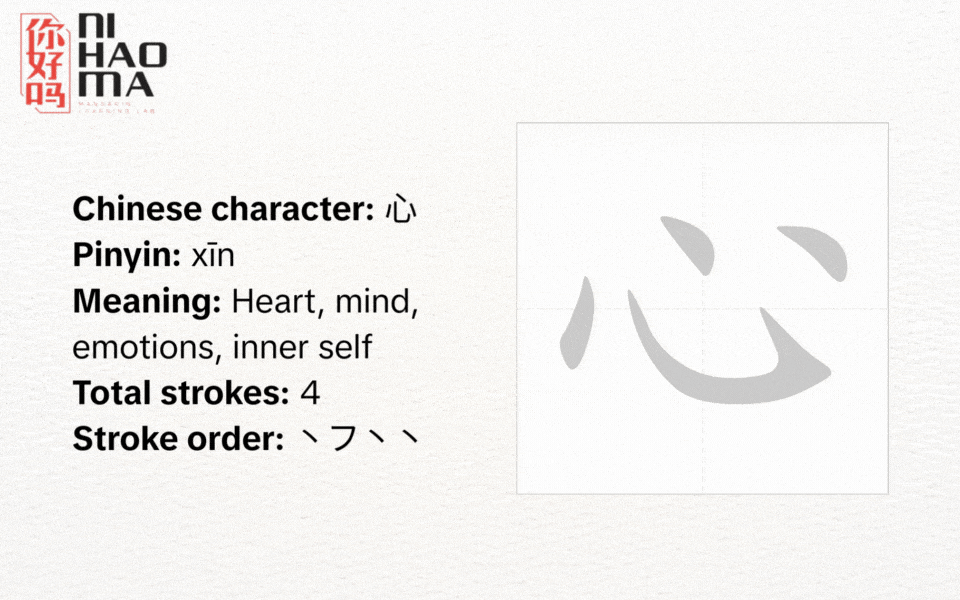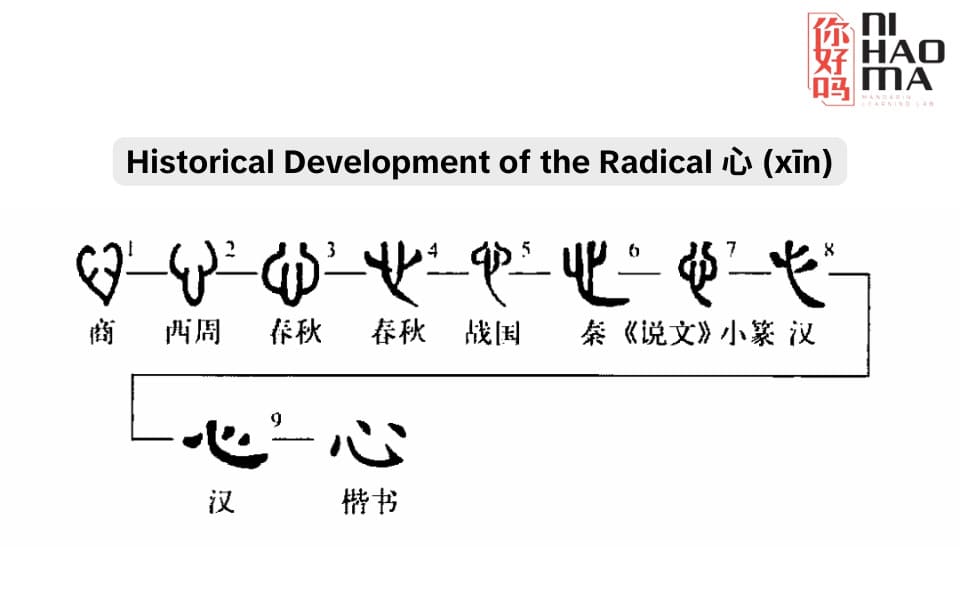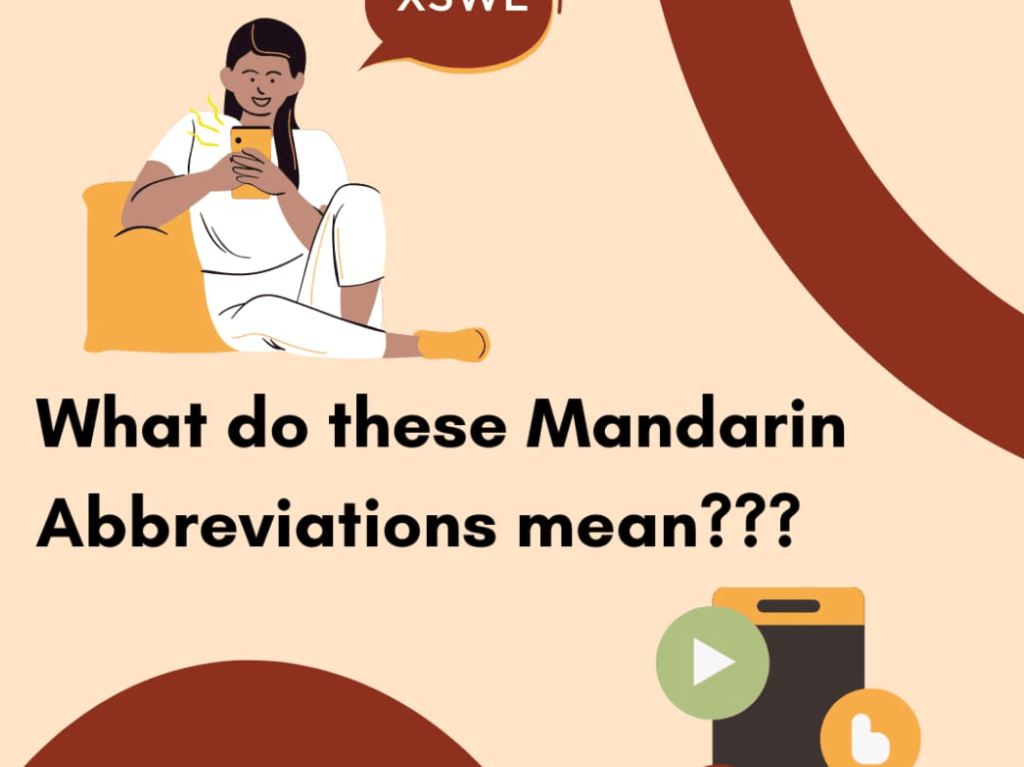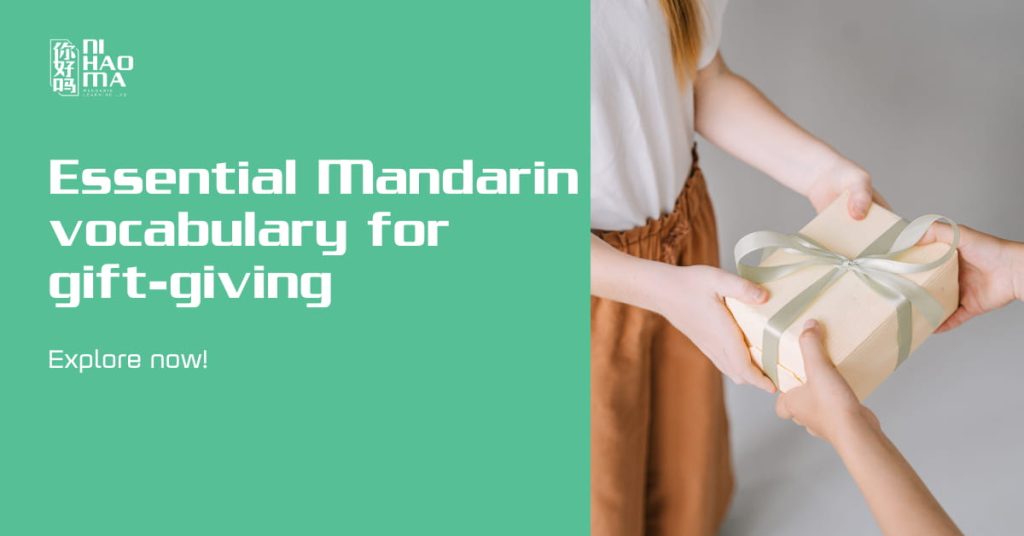The heart radical in Chinese is one of the most symbolic and culturally significant radicals in the entire Han character system, as it directly relates to human emotions, thoughts, and inner feelings. Mastering this radical not only helps learners recognize characters more quickly but also understand their deeper meanings. In this guide, we will explore the meaning of the heart radical, how to write it correctly, and common vocabulary examples that contain it.
What Is the Heart Radical in Chinese?
The heart radical in Chinese (心) is the 61st radical in the system of 214 Kangxi radicals. Its original meaning is “heart”—representing the physical heart as well as the mind, emotions, and inner self.
When used as a component in Chinese characters, the heart radical typically expresses ideas related to feelings, thoughts, awareness, emotions, and mental activities. The heart radical appears in two common forms: full form (心 — commonly placed at the bottom of a character) and abbreviated form (忄 — often called the “standing heart radical,” usually appearing on the left side).

- Character: 心
- Pinyin: xīn
- Meaning: Heart, mind, emotions, inner self
- Total strokes: 4
- Stroke order: 丶フ丶丶 (dot – hook – dot – dot)
How to Write the Heart Radical in Chinese
The full form of the heart radical in Chinese (心) consists of four basic strokes written in the following order:
| Stroke Order | Stroke Name | Description |
|---|---|---|
| 1 | Dot (丶) | A small left-leaning dot written on the left side of the radical. |
| 2 | Hook (フ) | A hook stroke written to the right of the first dot, curving slightly and flicking upward. This is the main central stroke. |
| 3 | Dot (丶) | A small right-leaning dot placed near the middle of the hook. |
| 4 | Dot (丶) | A final dot placed at the upper right of the hook. |
The Position of the Heart Radical in Chinese Characters
Chinese radicals can appear in different positions within a character, and each position often reflects nuances of meaning. The heart radical in Chinese is no exception. Below are the two most common placements and how their positions influence meaning.
When the Heart Radical Appears on the Left
This is the most common placement. When the heart radical appears on the left, it takes the abbreviated form 忄. Characters with 忄 usually describe emotions, mental states, attitudes, or psychological activities.
Structure of the standing heart radical (忄):
- A dot slanting downward from right to left (丶)
- A vertical downward stroke (丨)
- A dot slanting downward from left to right (丶)
Examples:
- 情 (qíng) – feelings, emotion
- 快 (kuài) – happy, fast
- 怕 (pà) – afraid

When the Heart Radical Appears at the Bottom
When the heart radical in Chinese 心 is placed below another component, the resulting characters often convey complex emotional states, deep thoughts, intentions, or respectful attitudes.
Examples:
- 想 (xiǎng) – to think, to miss
- 意 (yì) – idea, intention
- 您 (nín) – polite “you” (a respectful form of 你 nǐ)
50 Common Chinese Vocabulary Containing the Heart Radical
Recognizing the heart radical in Chinese not only helps learners guess the meaning of new characters more easily but also strengthens reading comprehension and daily communication skills. In this section, Ni Hao Ma introduces 50 of the most common Chinese words that contain the heart radical, complete with pinyin and Vietnamese meanings. This list will help you build vocabulary in a structured and memorable way.
| No. | Chinese Character | Pinyin | Meaning |
|---|---|---|---|
| 1 | 忙 | máng | Busy |
| 2 | 快 | kuài | Happy, fast |
| 3 | 想 | xiǎng | To think, to miss |
| 4 | 情 | qíng | Emotion, feeling |
| 5 | 感 | gǎn | To feel, sensation |
| 6 | 忧 | yōu | Worry |
| 7 | 怒 | nù | Anger |
| 8 | 忍 | rěn | Patience, to endure |
| 9 | 恐 | kǒng | Fear |
| 10 | 悲 | bēi | Sadness |
| 11 | 您 | nín | Polite form of “you” |
| 12 | 惜 | xī | To cherish, to regret |
| 13 | 慢 | màn | Slow |
| 14 | 志 | zhì | Willpower, aspiration |
| 15 | 思 | sī | To think |
| 16 | 愿 | yuàn | Wish, desire |
| 17 | 悔 | huǐ | Regret |
| 18 | 愤 | fèn | Rage, indignation |
| 19 | 惊 | jīng | Surprise |
| 20 | 恋 | liàn | Love, affection |
| 21 | 慌 | huāng | Panic, confusion |
| 22 | 性 | xìng | Personality, gender |
| 23 | 德 | dé | Virtue, morality |
| 24 | 忘 | wàng | To forget |
| 25 | 恨 | hèn | Hatred |

| No. | Chinese Character | Pinyin | Meaning |
|---|---|---|---|
| 26 | 慎 | shèn | Careful, cautious |
| 27 | 恩 | ēn | Grace, kindness |
| 28 | 恆 | héng | Constant, lasting |
| 29 | 愉 | yú | Joyful, delighted |
| 30 | 態 | tài | Attitude, state |
| 31 | 怜 | lián | Pitiful, sympathetic |
| 32 | 怕 | pà | Afraid |
| 33 | 忠 | zhōng | Loyalty |
| 34 | 悪 / 恶 | è | Evil, bad |
| 35 | 慈 | cí | Kind, benevolent |
| 36 | 悟 | wù | Realization, enlightenment |
| 37 | 悄 | qiǎo | Quiet, silent |
| 38 | 悼 | dào | To mourn |
| 39 | 愁 | chóu | Worry, sorrow |
| 40 | 患 | huàn | Trouble, misfortune |
| 41 | 念 | niàn | Thought, remembrance |
| 42 | 忌 | jì | Taboo, jealousy |
| 43 | 愚 | yú | Foolish |
| 44 | 慧 | huì | Wisdom, intelligence |
| 45 | 悦 | yuè | Joyful, pleasing |
| 46 | 态 | tài | State, condition |
| 47 | 恼 | nǎo | Annoyed, upset |
| 48 | 慷慨 | kāngkǎi | Generous |
| 49 | 忧 | yōu | Anxiety, worry |
| 50 | 愿 | yuàn | Wish, desire, aspiration |
Sample Dialogues Using Vocabulary with the Heart Radical in Chinese
Now that you’ve learned many words containing the heart radical in Chinese, it’s time to see how they are used in real-life contexts. Below are three example conversations to help you understand how emotional and psychological terms naturally appear in daily communication.
Dialogue 1
A: 你今天心情怎么样?
Nǐ jīntiān xīnqíng zěnmeyàng?
(How’s your mood today?)
B: 我有点儿不开心,因为工作太忙了,而且昨天晚上没休息好。
Wǒ yǒudiǎnr bù kāixīn, yīnwèi gōngzuò tài máng le, érqiě zuótiān wǎnshàng méi xiūxí hǎo.
(I feel a bit down because work is too busy, and I didn’t sleep well last night.)
A: 这样啊,那你要注意休息,别让自己太累了。
Zhèyàng a, nà nǐ yào zhùyì xiūxí, bié ràng zìjǐ tài lèi le.
(I see. Then you should rest more and not overwork yourself.)
B: 我知道,可是最近还有好多事情要处理,真是让我心烦。
Wǒ zhīdào, kěshì zuìjìn hái yǒu hǎoduō shìqíng yào chǔlǐ, zhēnshi ràng wǒ xīnfán.
(I know, but I still have so much to handle lately. It’s really stressing me out.)
A: 不要太担心,你可以慢慢处理,每次完成一件事就会轻松一点。
Bùyào tài dānxīn, nǐ kěyǐ mànman chǔlǐ, měi cì wánchéng yí jiàn shì jiù huì qīngsōng yìdiǎn.
(Don’t worry too much – take things slowly. You’ll feel better each time you complete one task.)

Dialogue 2
A: 我为你准备了一份生日礼物,很用心挑选的,希望你喜欢。
Wǒ wèi nǐ zhǔnbèile yí fèn shēngrì lǐwù, hěn yòngxīn tiāoxuǎn de, xīwàng nǐ xǐhuān.
(I prepared a birthday gift for you. I chose it with great care, and I hope you like it.)
B: 哇,真的很感动!你还记得我最喜欢的颜色!
Wa, zhēn de hěn gǎndòng! Nǐ hái jìdé wǒ zuì xǐhuān de yánsè!
(Wow, I’m really touched! You even remembered my favorite color!)
A: 当然记得啊,我每次看到你喜欢的东西都会记在心里。
Dāngrán jìdé a, wǒ měi cì kàn dào nǐ xǐhuān de dōngxi dōu huì jì zài xīn lǐ.
(Of course I remember. Whenever I see something you like, I always keep it in mind.)
B: 真是太贴心了,我太高兴了!
Zhēnshi tài tiēxīn le, wǒ tài gāoxìng le!
(That’s so thoughtful! I’m really happy!)
A: 希望你每天都能开心,心里充满快乐。
Xīwàng nǐ měitiān dōu néng kāixīn, xīn lǐ chōngmǎn kuàilè.
(I hope you feel happy every day, with your heart full of joy.)
B: 谢谢你,你真的让我觉得很感动。
Xièxiè nǐ, nǐ zhēn de ràng wǒ juéde hěn gǎndòng.
(Thank you – you really moved me.)

Dialogue 3
A: 最近你看起来有点儿忧虑,发生什么事了吗?
Zuìjìn nǐ kàn qǐlái yǒudiǎnr yōulǜ, fāshēng shénme shì le ma?
(You seem worried lately. Did something happen?)
B: 我担心考试考不好,复习得不够充分。
Wǒ dānxīn kǎoshì kǎo bù hǎo, fùxí de bù gòu chōngfèn.
(I’m afraid I won’t do well on the exam because I haven’t reviewed enough.)
A: 别太担心,你已经准备得很好了,相信自己。
Bié tài dānxīn, nǐ yǐjīng zhǔnbèi de hěn hǎo le, xiāngxìn zìjǐ.
(Don’t worry—you’ve prepared really well. Believe in yourself.)
B: 但是我还是有点儿心慌,怕到时候紧张。
Dànshì wǒ háishì yǒudiǎnr xīnhuāng, pà dào shíhou jǐnzhāng.
(But I still feel anxious and worry that I’ll get nervous during the exam.)
A: 没关系,可以先深呼吸,放松心情,再开始复习。
Méiguānxi, kěyǐ xiān shēnhūxī, fàngsōng xīnqíng, zài kāishǐ fùxí.
(It’s okay. Just take a deep breath, relax, and then continue reviewing.)
B: 好的,我会试着调整心态,不让自己太紧张。
Hǎo de, wǒ huì shìzhe tiáozhěng xīntài, bù ràng zìjǐ tài jǐnzhāng.
(Alright, I’ll try to adjust my mindset and not let myself get too tense.)
A: 对,我相信你一定可以做到,加油!
Duì, wǒ xiāngxìn nǐ yídìng kěyǐ zuòdào, jiāyóu!
(Yes! I believe you can do it—good luck!)
Conclusion
The heart radical in Chinese symbolizes human emotions, thoughts, and inner feelings. Understanding its meaning, writing rules, and common placements within characters allows learners to expand their vocabulary more efficiently and interpret Chinese characters more accurately. We hope this guide has brought you valuable insights—stay tuned for more helpful and engaging content from Ni Hao Ma!



